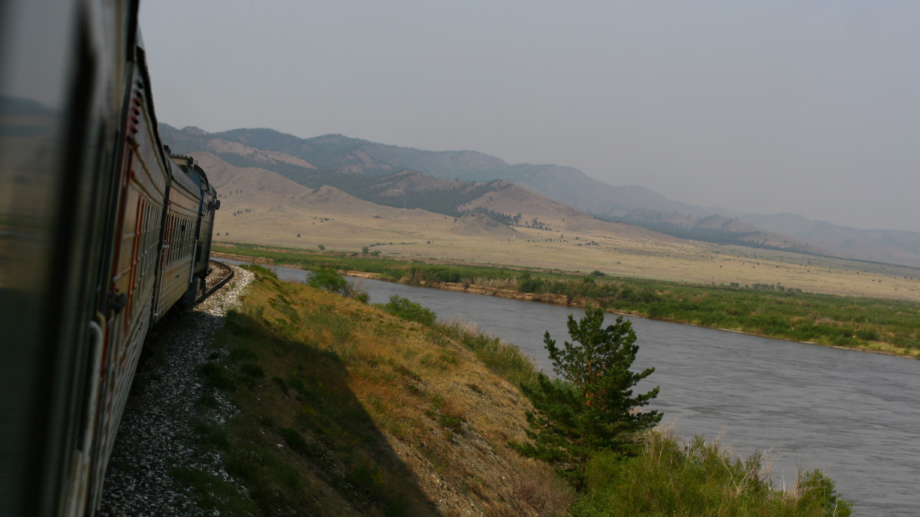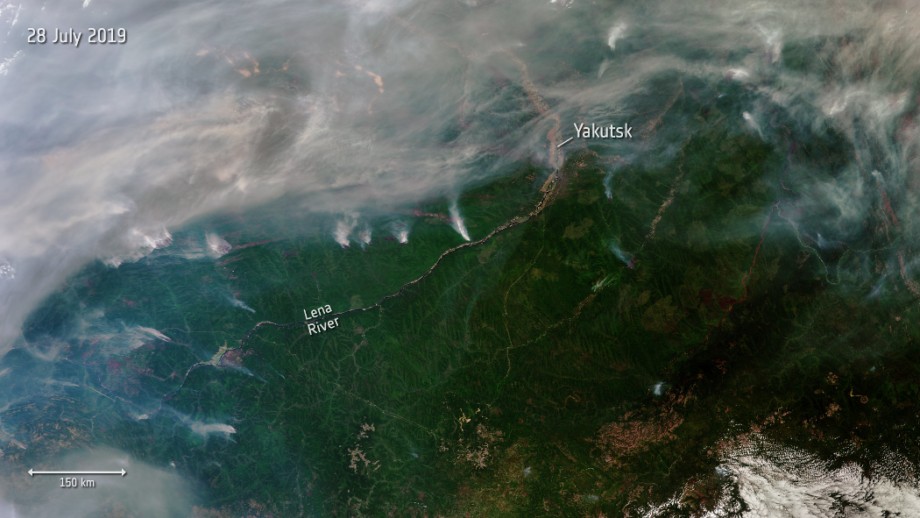Time to think
How the SARS-CoV-2 pandemic helped me reflect on the fieldwork that has yet to take place
Keeping the distance
Overland by train or car, it’s an approximate ten-thousand two-hundred and thirty-two kilometres between Leipzig and Yakutsk, the capital city of the Sakha Republic (Yakutia) in the Russian Federation. But that’s not the important number here. Rather, it’s the physically impossible and economically unviable one and a half meters between people in an air plane that make previously hardly noticed geographical distances insurmountable for people whose professions aren’t part of now critical infrastructures. My PhD deals with climate change and its effects (mainly in the form of extreme weather events and seasonal changes) on the water using practices of various people[1], communities and other stakeholders who depend on the Lena river and its water in their private or professional lives. It also happens to be outside of this category.
In early spring of this year, my visa application was in the bureaucratic pipeline of the North-Eastern Federal University in Yakutsk, the travel allowance of my scholarship provider applied for and family arrangements in terms of child care support during my field work absence thoroughly talked through.[2] My long-planned stay in and around Yakutsk was scheduled for May and June 2020 and seemed pretty much around the corner.

Figure 1: Someone else, travelling on the Trans–Siberian Railway”, copyright license CC BY-NC 2.0 @Nicolas Mirguet.
I look at the Lena river, the main transport artery northwards from Yakutsk and also otherwise pretty multi-functional natural infrastructure[3] as a vehicle and catalyst of past and current narratives and practices concerned with framing this part of the Arctic in accordance with economic, political and scientific special interests. With the help of history, theory and ethnography, I want to understand how current scientific concepts of climate vulnerability, adaptation and resilience relate with (neo)colonial extractivism, climate governance, the past and present infrastructural development of the Russian Arctic and the concrete lives of people who live in the midst of a circumpolar run on yet another “New North”[4]. To do a bit of document juggling, be a little patient with the slow-moving university bureaucracy and then go to this distant place to find out, seemed normal.
At the time, what worried me more than questions of privilege (to basically go wherever I want on the planet) was the carbon footprint of my journey and whether flying was justified (#flygskam), given the very limited field work time I could allow myself while leaving a small child with my working partner at home. However, before I could make the choice between buying either a train or plane ticket, the news of an ever-accelerating virus epidemic in China, and shortly thereafter, in many other countries around the world, kept making their way deep into the competitive and usually short-lived media attention arena. With regard to my field work, doubt was followed by uncertainty and only a few weeks later, as international borders closed, it became clear that I would not be able to go to Yakutsk as planned.
Then came the nation-wide lock-down in Germany and my priorities shifted to adapting to the new reality of (temporary) full-time childcare, greatly decreased everyday mobility and concerns for the well-being of family and friends.

Figure 2: “Wildfires near Yakutsk in summer 2019”, copyright license CC BY-SA 2.0 @ESA.
Time to think
Now, some seven months into the pandemic, I feel both privileged and disadvantaged at the same time. My scholarship keeps paying for my bills which is great. I feel incredible lucky for not having to worry about how to pay the next rent or whether I will ever get out of unemployment again. At the same time, I feel that the need to postpone my fieldwork has dealt quite a blow to my PhD schedule which is, with every passing week and moth, harder to make up for. At times, I feel increasingly alienated from the place/location of my research, a place I have never been to and which currently seems not only very far away but also out of reach. But where does this uncanny feeling about “the field” come from? I believe that before the pandemic pulled the plug on my planned field research, I was trapped in the usual PhD hamster wheel of finding a topic, securing the support of a doctoral supervisor, acquiring funding, a process in which one constantly has to sell his or her project and which doesn’t leave a lot of room for critical self-reflexion. Now, a few months after this compulsive break, I have begun to ask myself how my own research enqueues itself in an academic tradition which still often takes for granted that young Europeans go to non-European localities for their research. Why would I go to a place so far away when climate change was also happening here in Leipzig too, in front of my doorstep? What benefit would my future informants in Siberia gain through my presence there? Is my gaze as an outsider, a stranger really that helpful? And wasn’t helpfulness at all times a euphemistic garb of colonial intervention?
It seems that for me personally, there will be more time to reflect upon that, since despite the fast-paced Russian efforts and alleged successes of creating a vaccine, it seems unlikely that a relatively wide-ranging freedom of movement between Germany/the EU and Russia will be restored in the next couple of months – especially with the prospect of a second wave of infections in the coming autumn and winter months.
Luckily, I was offered to collaborate with students from Yakutsk in working on the impacts of climate change on the ice road usage of the Lena river in the coming winter season. I hope that we will manage to find a common mode of long-distance collaboration which bridges the gap that the pandemic has made even more visible. Until then, I will have to rely on the internet to further approach and enter “the field”.

Figure 3: The frozen Lena river is used as an ice road usually between October and April, copy right licence CC BY-NC 2.0.
Chumming up with Instagram
The aforementioned experiences also lead me to the larger question about the role of in-person ethnographic fieldwork and the authority it grants to the data resulting from it. While there is a long history of white bodies being able to freely travel the globe, nowadays this freedom seems to have greatly proliferated through optic fibre cables and satellite networks. But then, the internet is obviously not that free floating nexus of limitless possible places and opportunities to meet each other. Rather, it’s a corridor with a few big brands stamped on the doors. But where do you knock when you do not really like social media? I had a Facebook account for a year or so before I deleted it. That was some ten years ago. More so, I think that big tech has conquered and distorted large parts of the internet and our relationship with it in ways that are very problematic, if not dangerous for both democracy and our sanity. Despite my deep mistrust and aversion of those somewhat Orwellian virtual spaces, I currently find myself scrolling through an endless flood (bottomless feed) of ephemeral images on Instagram, the fotophile side branch of Facebook which will certainly be remembered for its contribution of permanently altering the physiognomy of the human thumb (and brain).[5] After it turned out that vk.com, the Russian copycat of fb harboured only more or less deserted groups in relation to my research interests and a lot of forums I visited seemed only marginally more vivid, I discovered that people on Instagram were pretty active when it comes to displaying themselves on, next to, in front of or otherwise in close proximity with the river.
I created a pseudonymous profile on the platform since I felt uncomfortable with using my real name for my online research. The Russian state has become increasingly authoritarian in recent years and both surveillance and repression of activists of all sorts and civil society as a whole has grown accordingly.[6][7] I contacted quite a few people via private message inside Instagram and asked them for an interview on a number of questions which are related to their use of/relation with the Lena river. Unfortunately, the response rate so far has been rather modest and I have not managed to conduct an interview yet. I would be interested to learn about the experience of other PhD researchers in terms of making contact with informants online and what has or hasn’t worked for them.
Written on 05 October 2020
Hannes Rassmann is currently working on his PhD in social anthropology at the University of Hamburg about the impacts of climate change and extreme weather on the natural infrastructure of the Lena river and the thereto related practices of different water using communities and stakeholders. He completed his MA in social anthropology at the University of Leipzig in 2018 with a thesis on libertarian squatters and the housing question in Barcelona. In his free time, he loves to garden, spend time with his daughter and train Brazilian jiu-jitsu in a self-organized sports group.
Footnotes & References
[1] Chao, Sophie. 2020. When Crisis Brings Us Closer: Reflecting on Family, Fieldwork, and Faraway Homes in the COVID-19 Pandemic. http://somatosphere.net/2020/when-crisis-brings-us-closer-reflecting-on-family-fieldwork-and-faraway-homes-in-the-covid-19-pandemic.html/
[2] Chao, Sophie. 2020. When Crisis Brings Us Closer: Reflecting on Family, Fieldwork, and Faraway Homes in the COVID-19 Pandemic. http://somatosphere.net/2020/when-crisis-brings-us-closer-reflecting-on-family-fieldwork-and-faraway-homes-in-the-covid-19-pandemic.html/
[3] Carse, Ashley. 2012. Nature as infrastructure: Making and managing the Panama Canal watershed. In: Social Studies of Science 42 (4), 539– 563. DOI 10.1177/0306312712440166
[4] (Stuhl, Andrew 2013: 97)
[5] Tortorici, Dayna. 2020. Infinite scroll: life under Instagram.
[6] It’s going down. 2018. A Russian Anarchist Speaks on Ongoing Torture & Repression: https://itsgoingdown.org/a-russian-anarchist-speaks-on-ongoing-torture-repression/
[7] Human Rights Watch. 2020. Russia. https://www.hrw.org/world-report/2020/country-chapters/russia

































